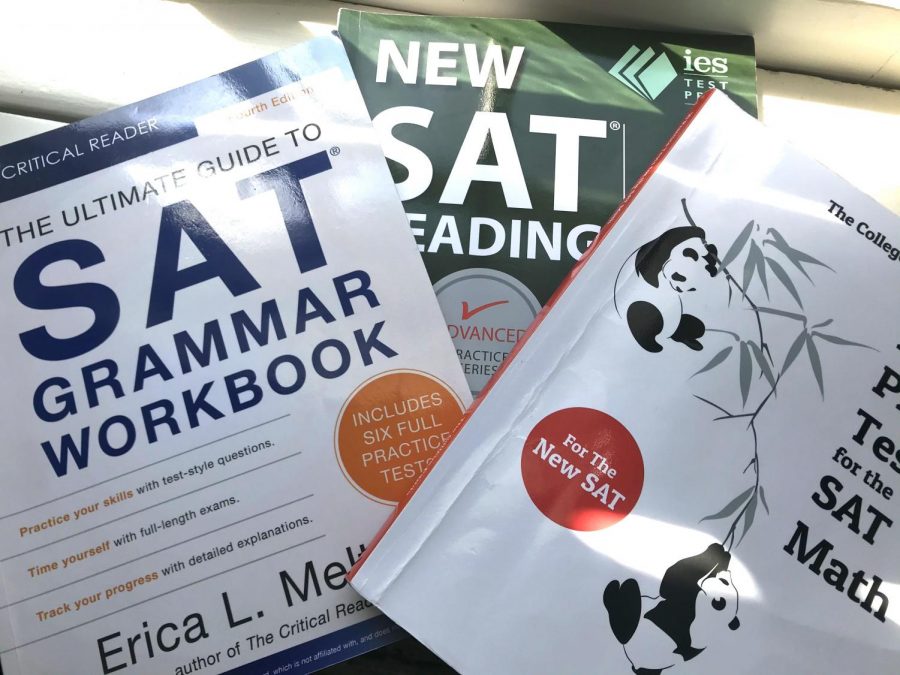Due to the Coronavirus outbreak in Westchester County and in New York State in general, the SAT test that would have been administered on Saturday, March 14th, will be postponed.
SAT Postponed Due to Coronavirus
March 12, 2020
Due to current travel restrictions and school closures, College Board, a non-profit organization in the United States, has decided to cancel registrations for the March 14th SAT in areas that have been affected by the coronavirus.
Some test centers in Westchester County have postponed the SAT while others have not. A test scheduled at White Plains High School has been postponed even though as of Wednesday, the school district has received no confirmed cases of the coronavirus. According to an email from an Assistant Principal at White Plains High School, the College Board will electronically release a makeup date once they have reached an informed decision. When asked to comment on her feelings regarding the SAT, Eliza Elman ‘21 replied “other schools have the opportunity to at least have it postponed. I think that at the very least they could have decided on a makeup date.”
Still, many students understand the necessity of the College Board’s decision. “I think canceling it was the right thing to do because we don’t want the coronavirus spreading more than it already has” concluded Emily Messerle ‘21, who was scheduled to take the test in White Plains as well. “It’s not very shocking considering a lot of schools are closing and events are being canceled in general. They are prioritizing safety.” said Alexa Rosenbloom ‘22.
Test centers in Port Chester Senior High School, New Rochelle High School as well as Early College High School located in Yonkers have been closed as well. A test center in The Leffell School located in Hartsdale also declared that they will not be open on Sunday and thus no testing will take place. Despite this, students who have signed up but are unable to test due to health concerns will receive a full refund.
Test centers located in surrounding areas of Scarsdale have also closed. At least two SAT exams have been canceled in the Lower Hudson Valley. Specifically, the Lakeland Central School District is looking for an alternative location for the SAT scheduled at Walter Panas High School located in northern Westchester County. Lastly, exams have been confirmed canceled in all five boroughs of New York City depending on the location of the testing center.
The ACT is scheduled for April 4, 2020 while another SAT is scheduled for May 2, 2020. Only time will tell if the tests will be administered on these proclaimed dates or if they will be rescheduled due to increasing health concerns. Jaslee Carayol, director of media relations for the College Board, ensures that the organization is closely monitoring the spread of the coronavirus.
For more information or current updates visit the College Board Website.
Coronavirus’s Impact on the College Application Process
The college admissions process has become a major stressor and uncertainty for high school students. Nowadays, having good grades and participating in extracurriculars can no longer guarantee a spot at selective universities. Acceptance rates are at an all-time low, while university tuitions are on the rise. With that being said, the introduction of a global pandemic can only make admissions more difficult, right? Not necessarily.
As COVID-19 quickly shuts down high schools internationally, colleges need to become more lenient in the admission process. Educators are slowly adapting to distance learning, which has caused grading to temporarily come to a halt, affecting transcripts of high school and college students. Social distancing has led to the postponement of spring testing and admission deadlines, giving applicants more freedom and time to prepare. Some schools are considering neglecting standardized tests from admissions. For example, Tufts University has implemented a three year trial on making standardized tests optional for applicants.
The growing restrictions on global travel have also made the process easier for prospective juniors and seniors. As a result of the pandemic, Universities are not recruiting Chinese international students, leaving many spots open for other students. Because it is uncertain whether other international students are able to travel to the United States, many colleges have accepted applicants who had initially been placed on the waitlist.
Economic instability and social distancing has made it difficult for high schoolers and colleges to make important decisions. As more and more workers are being laid off, financial aid is likely going to become a necessity for many more applicants.
While most view spring break as an opportunity for road trips and relaxing on beaches, it is also a popular time for juniors to take planned visits to universities. With many colleges closing down for the remainder of the semester, planned visits have been changed to virtual tours. While virtual tours and online content cannot replace in-person visits, virtual platforms such as YouVisit and Concept3D are providing the best possible alternatives for students.
COVID-19 has managed to interfere with all aspects of our daily lives, especially with the college application process. Universities are on top of the situation and communicating closely with students to ensure the process runs as smoothly as possible. Despite the abrupt changes in this process, the diligence of universities is making the best of these unprecedented times.
Test Optional Movement amid Covid-19

With limited testing options for incoming applicants due to the COVID-19 pandemic, many schools have considered going test optional, or even announcing they will not consider standardized tests in their admissions process.
A record number of colleges are joining more than 1,100 others that have already dropped standardized test scores for entrance, according to the National Center for Fair and Open Testing. That is nearly half of 2,400 four-year colleges in the nation. Many colleges cited the COVID-19 pandemic and the cancellations of SAT/ACT spring testings as a catalyst and did not plan to adopt these policies permanently. However, history has shown that once a college goes test-optional, it tends to stick with the practice.
Prior to the pandemic, the trend has already picked up, leaning towards a broader access and holistic admission.
The appeal has double advantages for the colleges. Dropping the SAT/ACT requirement typically increases applications and decreases the acceptance rate. The average test scores reported to U.S. News, for example, would climb as the low scores are out of the tabulation.
With the University of California system voting on May 21 to phase out the SAT and ACT as an admission requirement over the next four years, this major shift will exemplify how going test-optional will impact students and colleges in the future.
Oren Iosepovici, Director of SHS Counseling Department stated, “These standardized tests are often the biggest cause of angst among our juniors. We appreciate that more and more schools are going that test-optional route, but we also recognize that students spend significant time, and in some cases significant money, to prepare for these exams. In some cases, our students do well in these tests, and those results can serve them well.”
College entrance exams have long been denounced for magnifying the discrepancies in America’s education system on income or race, and also for the opportunity for cheating. Further, “Standardized tests are quite expensive for some, while others can take multiple times. By going test-optional, schools are enabling families with lower incomes to be on a more equal playing field,” stated Rishabh Gharekhan ’20.
The test-optional policies aim to diversify an applicant pool, broadening access, and encouraging more applications from high-achieving students who have historically been underrepresented at selective colleges. This would include low-income or first-generation-to-college students, groups that haven’t traditionally scored as well on standardized tests as students who can afford to take practice tests or hire testing coaches to help them prepare.
“There are some who feel they present an important distinguishing factor among many similar applicants and others who believe they unfairly disadvantage those with limited resources. Given that….colleges’ mission is supporting students who may not have had the same opportunities as others, it is likely that standardized tests will continue to be seen as a barrier in encouraging a wide variety of applicants to consider specific schools..” explained by Mr. Iosepovici
“Colleges going test-optional will allow more students to show themselves in the admission process beyond a test score, and emphasize the character and individuality of students,” said SHS junior Phoebe Shearer ’21.
Students ought to view test-optional applications as giving them a choice on how they present themselves to a college, and many respond creatively with entrepreneurial proposals, non-profit volunteers, artwork, and other ideas. “Given that there are no standardized exams to evaluate, admissions officers are by nature forced to take an even closer look at other aspects of the student’s application…the transcript plays the most significant role in the evaluation, followed by other parts of the application, including the essay, letters of recommendation..,” furthered Mr. Iosepovici.
However, do the test-optional policies actually influence admission selectivity and diversity?
A study from October 2018 compared the data from the 127 colleges with test-optional policies from 2009-2014 to the 1,649 schools without. The findings are SAT optional policies have no effect on racial and socioeconomic diversity, no influence on the gender ratio of institutions, no effect on the quality of the student population. SAT optional policies briefly increase applications, but the effect is not sustained over time. Data also shows percentages of first-generation-to-college enrollees, underrepresented minorities, and women are most likely on the rise in some test-optional admissions, while some other colleges see less change of the makeup of their enrollment.
Whether colleges going test-optional will truly have an effect on diversity, in the long run, is still waiting to be seen. One thing is for certain: test-optional is no longer an outlier, and its impact will be long-lasting on the higher education admission system, big or small.
Test optional movements are changing fast. Below is the SAT/ACT tests and SAT subject tests requirements for 2020 to 2021 applicants, as of June 20, 2020:
SAT/ACT Optional/not required:
Cornell
Columbia
Dartmouth
Harvard:
UPenn:
CalTech: Moratorium two year SAT/ACT test-optional; Eliminated SAT Subjects requirement
UC Colleges
UVA:
University of Chicago
Yale: SAT not required; SAT Subjects not considered
Brown:
Princeton: recommends two SAT subject tests for Engineering
Stanford
Northwestern:
Georgetown
SAT/ACT Required:
MIT
University of Michigan




